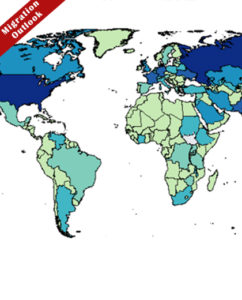Migrant numbers growing faster than world population – new data shows
The numbers of international migrants are now growing faster than the world population generally for the first time in history, according to new figures from the United Nations.
The number of migrants globally has reached 272 million – up from 211 in 2010. And currently international migrants – defined as anyone who changes their “country of usual residence” – make up 3.5 per cent of the global population, compared to 2.8 per cent in the year 2000, according to the data from the UN’s Department of Economic and Social Affairs (DESA).
The estimates are based on official statistics of foreign populations gathered from censuses and the numbers include any person who is moving or has moved across an international border, regardless of citizenship status or motive – meaning the data includes migrants and refugees.
 It shows Europe hosts the largest number of international migrants, at 82 million; followed by North America, at 59 million; with 51 million in the United States alone – the largest number in a single nation.
It shows Europe hosts the largest number of international migrants, at 82 million; followed by North America, at 59 million; with 51 million in the United States alone – the largest number in a single nation.
North Africa and Western Asia host around 49 million migrants, and along with sub-Saharan Africa, are seeing the most significant influx in foreign populations.
The share of international migrants in the total population varies considerably across regions, the report shows, where foreign-born individuals comprise 21 per cent of the population of the Oceania region, and 16 per cent of all people in Northern America.
With conflict-driven forced displacements continuing to increase, refugees and asylum seekers account for close to a quarter of global increases, which have risen by 13 million between 2010 and 2017, the data shows.
Although migration is global, most journeys are taking place within a limited set of countries, with the US, Germany, and Saudi Arabia making up the top three.
Director for DESA’s Population Division, John Wilmoth told media that the data was critical in understanding the important role of migrants and migration in the development of both countries of origin and destination.
“Facilitating orderly, safe, regular and responsible migration and mobility of people will contribute much to achieving the Sustainable development Goals,” he said.
Mr Wilmoth said the contribution of migrants both in host countries and countries of origin, included sending valuable remittances back to countries of origin and a major social contribution through transmission of ideas.
In 2019, the countries with the largest diaspora populations were India (17.5 million), Mexico (11.8 million) and China (10.7 million).
See DESA’s full 2019 migration data set here












